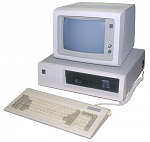There have been a rash of anniversaries in the last week or so for milestones in the computer industry.
30 years
MS-DOS: 27 July 1981
IBM-PC: 12 Aug 1981
 More than one person has said that the deal that Bill Gates and Paul Allen made with Seattle Computer Products to buy what was originally known as QDOS and then rewrite it as MS-DOS was one of the best business deals ever made. See a slideshow: A Quick Look At The 30-Year History Of MS DOS.
More than one person has said that the deal that Bill Gates and Paul Allen made with Seattle Computer Products to buy what was originally known as QDOS and then rewrite it as MS-DOS was one of the best business deals ever made. See a slideshow: A Quick Look At The 30-Year History Of MS DOS.
Apple had shown that it was possible to create a "microcomputer" for a mass market. IBM saw that and used its leverage in the business community to put a computer in front of every information worker in the world.
From an interview that PC-Magazine did with Bill Gates 30 years ago:
It would be nice if there was a hard disk and I'm sure the independent vendors will come and put one of those in it.[
1]
[...]
It's possible to do a much better machine in a lot of ways from a hardware point of view.
[...]
This machine will be significant because it will usher in a new generation of portable software. [...] I think five years from now the amount of software and the quality of the software on this machine will be incredible.
[...]
The Apple II does not have enough communications capability and CRT capability to really be used in [personal work station] mode. Until the IBM PC came along, there was no product that could be offered to fill that need and I think that it is a huge market.
20 years
World-Wide Web: 6 August 1991

The document (
WorldWideWeb: Proposal for a HyperText Project) envisaged the Web as being used for a variety of purposes, such as “document registration, on-line help, project documentation, news schemes and so on.” However, Tim Berners-Lee and his collaborator Robert Cailliau, a Belgian engineer and computer scientist, had the foresight to avoid being too specific about its potential uses.
Thing is — and I know lots of people in the same position — I was around for these things.